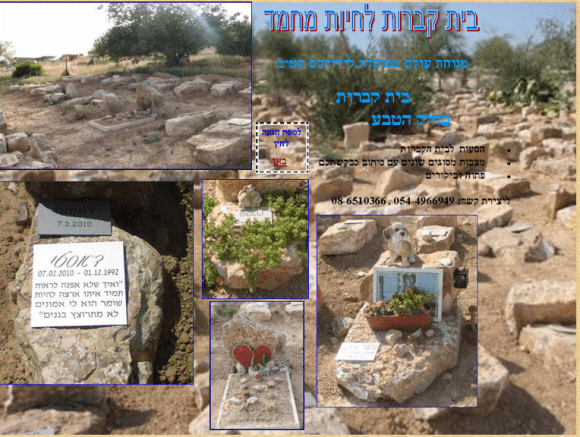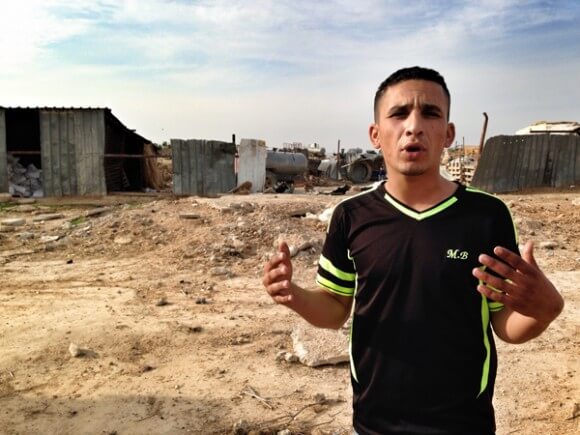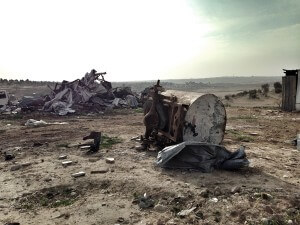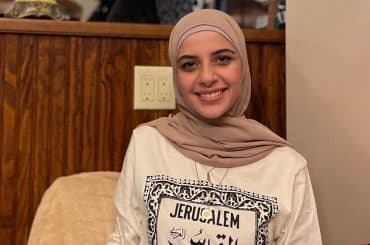
Far enough from paved roads that cellular reception cuts out, in the middle of a national forest in Israel, there is a canine resting place.
The pet cemetery and adjoining ranch house owned by Amos and Shosh Gold affords the civil-engineered trappings of placid suburban life, but stamped in a dehydrated nature reserve; water, electricity and waste removal serve the house and dog burial plots as a result of city plans that have pumped millions into making life attractive in the sparsely populated Negev desert.
Yet about two kilometers away is an officially-unrecognized Bedouin encampment with 24 residents from the Abu Alkin clan who want to continue to inhabit the Negev—even though they are excluded from the blueprints of development. The Abu Alkins live in an unrecognized village not on any map, meaning they are not allowed to be hooked up to municipal services and are forced to live off the grid.
These Arab citizens of Israel do not have the same luxuries of municipal services as the deceased, once Jewish-owned dogs decomposing in the watered sod of Goldog cemetery. Their town, which is barely a town, formerly had bonded stone houses and cement foundations, but all 16 of those structures were demolished by the state a year and a half ago.
Meanwhile, the site where animal companions such as Seadog are interred have all those benefits. Born 1995, laid to rest in 2009, Seadog’s grave and Hebrew embossed headstone has colored glass on it. His company– hundreds of other dead dogs. They are in plots meters away from an outdoor shower, a piano, and a kennel with caged and very alive dogs, guarded by roped pups that bark with fury when they hear soft footsteps or the sandy sound of tires running over a rocky dirt road. There is landscaping, there are outdoor lights.
When I visited the cemetery last week, a stocky middle-aged woman with cropped red hair and zebra print eyeglasses angrily greeted a researcher and me, canceling the interview we had set up a few days before. On the phone, a woman had identified herself to my Hebrew-speaking colleague as Shosh Gold, one half of the husband and wife proprietor pair. I believe I was now meeting Shosh, but she refused to give her name when we introduced ourselves (though she indicated she had spoken to my colleague on the phone). She said that there was some bad press two decades ago when the cemetery first opened and that her neighbors hate her, quite randomly. Then she threw us out.
We did manage to see the burial plots, kennel and guard dogs. I had wanted to verify if the cemetery with electrical and water connections serviced “Jewish dogs” only, while the Bedouin neighbors—very much alive—were without the same assistance.
The woman monitored our movements as if we were wandering cheetahs—and she a gazelle—until we rode off of the property.
She told us not to write about the cemetery, and not to use her name.

And so I improvised. I then had Khalil Alamour from the legal rights group Adalah call Goldog to inquire about pet funerals. Adalah is representing a nearby Bedouin village, Umm el-Hieran in a court case where the defendants are relatives of the Golds’ neighbors. In that case the Bedouins are being evicted by the state so that a Jewish-Israeli trailer park can re-locate on the same tract of land.
“People would never believe that the Israeli democratic state is uprooting their indigenous Bedouin citizens from their ancestral land in order to resettle Jews on the rubble of the same destroyed village,” said Alamour, “but that’s the fact.”
However, when Alamour phoned the same number that my Hebrew speaking colleague used to reach Shosh set up our interview, a woman answered and rebuffed him after he gave his identifiably Arab name. She said he had the wrong number—there was no pet cemetery. He could not arrange a funeral.
It was a completely different story when an Israeli journalistic colleague I enlisted as a fake customer called a few days later. A woman told him that a basic burial at Goldog costs 450 NIS (about $130) and one with a marker runs 750 NIS (about $215). When the Israeli colleague said that his dog “Napoleon” had died (not a true story, but we conceived him as a Labrador), the woman confirmed, “yes, this is a Jewish cemetery.”
When asked if there were any Arab-owned pooches in the burial ground, the woman said, “No, we haven’t had a request like this,” but offered, “if an Arab guy comes, we are not going to turn him away. Anyone who had a dog and served him loyally is welcome to come and bury him here.” Families can also invite guests for a ceremonial send off, should they choose.
So it is not that the Golds inter “Jewish dogs” (is there such a thing as a Jewish dog? I leave that to the Talmudists), but they only serve Jewish pet owners.

For decades the Golds and their repository have been able to avail themselves of an infrastructure that any citizen of any state should have a right to seek. “The gaps between the unrecognized Bedouin villages and the neighboring Jewish settlements are unbridgeable. More than that, even between them and recognized ones there are great gaps,” said Alamour. The first-world life juxtaposed to the Bedouin neighbor’s third-world reality is a microcosm of Israel’s ethnic-hierarchy that defines who is inside the system and who is excluded as if they are a foreigner.
“Martin Luther King 2014: I have a dream, to be a dead Jewish dog. For then I will have equal rights in Israel,” joked Alamour.

Within five minutes of leaving Goldog cemetery my sedan and I crept into the nearby Bedouin village. The conditions were astonishingly poor in comparison to the manicured and maintained cemetery. There I met Adam Abu Alkin, 21 and his brother Mohammed, 18. Amos, “he’s half-half” the pair agreed. In part, the Bedouins found the full-service business of pet cemetery, Boxer puppy breeding, and a doggie hotel strange. And of course there is resentment that dead Israeli dogs seemingly have more rights then they do.
“They don’t want us to live here, they want us to move to Hura,” said Adam explaining the state does not allow the Bedouins to hook up to electricity and water as a coercive move to entice them to relocate into a condescend Bedouin locality. Hura is a “planned township,” a reservation-like community devoid of job prospects and rife with crime. Bedouins consider relocating to Hura as the opposite of the Jeffersons, it’s movin’ on down. Families like Adam and Mohammed’s choose to continue living without basic elements of shelter, because it is the only way they can continue their work as shepards. Sheep and goats mill about in a pen at the edge of the township. In Hura there’s no room for grazing, only languishing in a life less served than where dogs go to die.


From Harpers Index via Pew
Percentage of American Jews who believe that following Jewish law is essential to Jewish identity : 19
Who believe that having a sense of humour is : 42
http://www.jta.org/2013/10/01/news-opinion/united-states/pew-survey-u-s-jewish-intermarriage-rate-rises-to-58-percent
American Judaism should secede from Zionism.
The one headstone that the Goldog website shows celebrates the friendship and fidelity of “Dusty”. Another American fantasy: suburbia on the West Bank, now, American-named Jewish dogs “resting in their eternal resting place in the bosom of nature.”
The hardcore settlers must detest this self-indulgence as much as they abhor Christian fundies. But when you are in the Zionist business, you must take help wherever you can get it: from Hagee to Micronesia to Dusty.
“When the Israeli colleague said that his dog “Napoleon” had died (not a true story, but we conceived him as a Labrador), the woman confirmed, “yes, this is a Jewish cemetery.” ”
What would she have said if it was a deutsche Schäferhund? Are those popular in Israel?
How can a dog be a Jewish dog? By being trained by Jews to eat dog food placed on genitalia of terrified Palestinian children, as described in:
Stone Cold Justice:
http://www.abc.net.au/4corners/stories/2014/02/10/3939266.htm#sthash.uruIdf6P.dpuf
“The woman monitored our movements as if we were wandering cheetahs—and she a gazelle—until we rode off of the property. She told us not to write about the cemetery, and not to use her name.”
What is she so afraid of? Bad publicity two decades ago? She’s feeling a little guilty and doesn’t want to admit it to herself, much less anyone else. If she truly believes that she is providing a legitimate service she would defend it. But then how would you defend providing better services to dead dogs than to the humans down the road?
Sometimes the lies we tell ourselves are worse than the lies we tell others.
Allison. A dead Jewish dog has no rights because it’s dead.
An Arab family that squats illegally on Israeli State land has many rights. They have the right to vote. They have the right to peacefully protest. They have the right to assemble. The right to freely worship. They have the right to petition the State to adjudicate their land claim.
So you see, these Arabs have lots more rights then the Jewish dog.